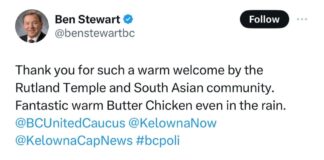Wet spring and snowy winter is no excuse to waste drinking water
METRO Vancouver on Monday launched its Stage 1 lawn watering restrictions, which will run until October 15, to help conserve drinking water during the driest part of the year.
Under the restrictions, lawns may only be watered in the mornings. This is to reduce the load on the system during evening hours when demand is highest for domestic uses such as dishwashing, laundry, and showers.
“Water demand always goes up in the summer, which is also when we get the least rain,” said Darrell Mussatto, Chair of Metro Vancouver’s Utilities Committee. “Reducing lawn watering has consistently proven to be an effective way to conserve water and lessen the strain on the region’s water transmission system.”
Lawn watering restrictions are part of Metro Vancouver’s Water Shortage Response Plan (WSRP), which regulates how residents, businesses and local governments use drinking water in the summer months or during periods of water shortages. The plan aslo addresses other water use activities such as car and power washing.
“We evaluate our Water Shortage Response Plan periodically to respond to water use trends, to climate change and to new drinking water infrastructure,” said Mussatto. “We appreciate the time people have taken to share their thoughts during our recent public consultations to make sure our program effectively conserves water while also meeting the needs of residents and business.”
After the hot and dry summer of 2015, Metro Vancouver began a thorough review of the WSRP, and proposed changes are currently being considered for the spring of 2018.
Metro Vancouver’s population continues to grow by more than 35,000 people every year. As population rises, continued per capita rate declines can potentially defer the need to expand the drinking water supply and infrastructure.
Climate change is impacting weather patterns across the globe, with more extreme incidents and stronger patterns of summer drought and winter storms. Snow packs are melting faster and earlier in the spring and average summer temperatures are climbing.
“A wet spring and a snowy winter isn’t an excuse to waste our drinking water in Metro Vancouver,” added Mussatto. “These regulations are in place to help residents develop long-term habits for drier years.”
Local governments throughout Metro Vancouver enforce the lawn watering restrictions through local bylaw regulations.
To help people maintain a healthy lawn while conserving water, Metro Vancouver has released a Waterwise Lawn Care guide, which is available online and as a brochure. Search “Lawn Care” on www.metrovancouver.org.
Lawn Watering Regulation: May 15 to October 15
Residential lawn watering allowed:
- Even-numbered addresses Monday, Wednesday, Saturday mornings 4 a.m. to 9 a.m.
- Odd-numbered addresses Tuesday, Thursday, Sunday mornings 4 a.m. to 9 a.m.
Non-residential lawn watering allowed:
- Even-numbered addresses Monday, Wednesday mornings 1 a.m. to 6 a.m.
- Odd-numbered addresses Tuesday, Thursday mornings 1 a.m. to 6 a.m.
- All non-residential addresses Friday mornings, 4 a.m. to 9 a.m.
MEANWHILE, City of Vancouver’s Director of Water, Sewer and Green Infrastructure, Daniel Roberge, said: “Even after a wet and snowy winter, it is important to be proactive about conserving tap water so that it lasts through the summer. Even with watering restrictions, water use in Vancouver doubles in the summer due to lawn and garden watering. Minimizing outdoor water use is the single biggest thing residents can do in the summer to ensure our treated drinking water isn’t wasted.”
Lawns in Vancouver generally need only one inch of water for one hour a week, including rainfall, to stay healthy and green. Even just one hour of lawn watering can use as much water as 25 toilet flushes, five loads of laundry, and five dishwasher loads combined.
The City and Park Board are also taking initiative to further reduce use of treated drinking water in public spaces, recreational facilities, and civic facilities. Initiatives include installing more water efficient fixtures, upgrading systems to reduce water wastage, and proactively listening to fire hydrants to fix leaks.
Residents can check their permitted watering through the VanConnect App or online at <http://vancouver.ca/










